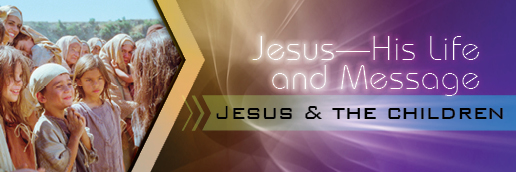
イエス、その生涯とメッセージ:イエスと子どもたち
7月 28, 2020
著者:ピーター・アムステルダム

イエス、その生涯とメッセージ:イエスと子どもたち
[Jesus—His Life and Message: Jesus and the Children]
July 28, 2020
共観福音書(マタイ、マルコ、ルカ)それぞれに、イエスが、祝福を受けるために連れて来られた子どもたちと触れ合う場面が描かれています。本記事では、ルカの福音書の記述を中心に、他の福音書からもいくつかの点を付け加えていきます。
イエスに触れていただくために、人々は乳飲み子までも連れて来た。弟子たちは、これを見て叱った。[1]
この福音書で、イエスのもとに連れて来られた子どもたちは「乳飲み子」と書かれていますが、マタイとマルコの福音書では、「子どもたち」とされています。[口語訳では、どちらも「幼な子ら」となっています。] どちらにせよ、「連れて」来られたとあるし、マルコの福音書では、イエスが「子どもたちを抱き寄せ」[2] たと書かれてあるので、かなり幼かったことが分かります。親が子どもたちをイエスのもとに連れて来た目的は、マタイの福音書にはっきりと書かれています。
イエスに手を置いて祈っていただくために、人々が子どもたちを連れて来た。[3]
弟子たちが叱った相手は、子どもではなく、イエスに祝福してもらおうとして自分の子を連れて来た親たちのようです。イエスのもとに子どもを連れて来た人たちをなぜ弟子たちが叱ったのか、福音書はその理由に触れていないので、よく分かりません。しかし、イエスの反応を見てみると、弟子たちの態度や行動は、イエスの考える子どもたちの扱い方とは異なっていたことが分かります。弟子たちはおそらく、イエスが時間を取って子どもたちと関わる必要はないと思ったのでしょう。
ローマ帝国時代、子どもは病気のせいで、また全般的に死亡率が高かったために、幼いうちに死ぬことがよくありました。また、望まれない子どもは、道の脇に放置されて死ぬこともありましたが、今日の感覚とは違い、当時、そのような慣行はショッキングなことでも異常なことでもありませんでした。望まれない乳幼児は、他の人に引き取られ、養子として育てられることもありました。他にも、集められて奴隷にされた子どもたちもたくさんいました。
古代において、親が乳児を戸外に遺棄した理由はさまざまです。貧困、家族の人数の抑制、新生児の外表性障害(肉眼形態上の異常)などです。言うまでもなく、先天異常を抱える子どもを育てることを選ぶ親もいました。これまでに発掘されたいくつもの古代の成人骨格には、そのような障害の影響が見られます。これは誕生の際に気づかれるようなものなので、身体的変形を抱えた子どもが成人した例のあることが分かります。
ローマ帝国領内にあっても、ユダヤ人は嬰児殺や遺棄を行いませんでした。ヨセフスやアレクサンドリアのフィロンといったユダヤ人著述家は、そのような慣行を野蛮な行為として強く非難しています。新約聖書には幼児の遺棄に関する直接の言及はありませんが、初代教会の著作物はキリスト教信仰に反するギリシャ・ローマの慣行を非難しており、そのような慣行には、剣闘士試合、堕胎、嬰児殺、幼児の遺棄などが含まれています。
子どもたちに手を置いて祝福してもらいたかった人々を弟子たちが叱ったのとは対照的に、イエスは弟子たちに、子どもたちがご自身のところに来るままにさせるよう言われました。
イエスは乳飲み子たちを呼び寄せて言われた。「子どもたちを私のところに来させなさい。妨げてはならない。神の国はこのような者たちのものである。」 [4]
マルコの福音書には、弟子たちの不公平な扱いに対して、イエスが憤られたと書かれています。[5] イエスからすれば、すべての人が重要な存在であり、乳幼児を含めて誰もイエスに近づくことを妨げられてほしくなかったのです。
それからイエスは、弟子のあり方について語られました。神の国は、この子たちのような者で成っていると言われたのです。イエスはそう言うことによって、子どもたちは価値ある存在であり、神の国に入るにふさわしいと指摘されました。イエスが喜んで彼らを受け入れられたことは、子どもたちもイエスに対して信頼と信仰を示すことが可能であることを物語っています。
「神の国はこのような者たちのものである」という表現には、もう一つ別の側面があります。イエスが子どもたちについて話しておられたことは、神の国の住人についてある基本的な点を示すものであり、それは、信者が子どものように神に頼り、信頼すべきであるということです。子どもたちが親に頼るように、神の子どもたちも神に頼るのです。
イエスは、神の国は「この者たち」、つまり子どもたちのものだとは言われませんでした。「このような者たちのものである」、つまり神の国は子どもの「ような」者たちのものだと言われたのです。イエスがおっしゃったのは、子どもは生まれつき善良であるということではなく、神の国に入るのに不可欠な資質があるということです。ある人は、次のように書いています。
あいにく、イエスも福音書作家たちも、それが一体どのような資質のことなのか、明らかにしていません。いくつか考えられるのは、(1) 自慢するようなものがなく、神に何かを要求できるようなものもない、幼い子どもたちの持つ謙遜さ、(2) 疑いを知らない単純な信仰、(3) 物に対する執着心がないこと、などです。この箇所の前の部分では、マタイが「子どもらしさ」を明確に謙遜として表現していることから、最初のものがもっとも合っているように思えます。[6]
イエスは続けてこう言われました。
よく言っておく。子どものように神の国を受け入れる人でなければ、決してそこに入ることはできない。[7]
神の国を受け入れるとは、神の支配権に服するということです。大人には自分の権力や権威があり、それは神の権威と衝突することがあります。そのため、神の国に入りたい者は、尊大にならず、子どものように神の国を受け入れなければいけません。ロバート・ステインは次のように書いています。
もっとも可能性のある解釈とは、私たちは子どもが物事を受け入れるように神の国を受け入れるべきである、つまり、疑うことなく、自分は重要であるという思い込みもなく、素直に従い、謙虚さと信仰・信頼を持って、受け入れるべきだということです。子どもが贈り物を受け取るように、神の国を受け取るべきだと。[8]
ルカの福音書では、ここで話が終りますが、マタイとマルコの福音書はどちらも、イエスが子どもたちに手を置かれたことに触れています。マルコには、イエスが「子どもたちを抱き寄せ、手を置いて祝福された」 [9] と書かれています。子どもたちを抱き寄せて祝福されたことは、イエスが子どもたちを受け入れ、また、子どもたちを連れて来た人々の意向を受け入れられたことを示しています。イエスは、ただ子どもたちに手を置くだけではなく、抱き寄せて祝福までされました。そうすることで、イエスは公に、子どもたちは神の国に受け入れられており、大切な存在であることを示されたのです。
注:
聖書の言葉は、特に明記されていない場合、日本聖書協会の口語訳聖書から引用されています。
参考文献
Bailey, Kenneth E. Jesus Through Middle Eastern Eyes. Downers Grove: InterVarsity Press, 2008.
Biven, David. New Light on the Difficult Words of Jesus. Holland: En-Gedi Resource Center, 2007.
Bock, Darrell L. Jesus According to Scripture. Grand Rapids: Baker Academic, 2002.
Bock, Darrell L. Luke Volume 1: 1:1–9:50. Grand Rapids: Baker Academic, 1994.
Bock, Darrell L. Luke Volume 2: 9:51–24:53. Grand Rapids: Baker Academic, 1996.
Brown, Raymond E. The Birth of the Messiah. New York: Doubleday, 1993.
Brown, Raymond E. The Death of the Messiah. 2 vols. New York: Doubleday, 1994.
Carson, D. A. Jesus’ Sermon on the Mount and His Confrontation with the World. Grand Rapids: Baker Books, 1987.
Charlesworth, James H., ed. Jesus’ Jewishness, Exploring the Place of Jesus Within Early Judaism. New York: The Crossroad Publishing Company, 1997.
Chilton, Bruce, and Craig A. Evans, eds. Authenticating the Activities of Jesus. Boston: Koninklijke Brill, 1999.
Edersheim, Alfred. The Life and Times of Jesus the Messiah. Updated Edition. Hendrickson Publishers, 1993.
Elwell, Walter A., ed. Baker Encyclopedia of the Bible. Grand Rapids: Baker Book House, 1988.
Elwell, Walter A., and Robert W. Yarbrough. Encountering the New Testament. Grand Rapids: Baker Academic, 2005.
Evans, Craig A. World Biblical Commentary: Mark 8:27–16:20. Nashville: Thomas Nelson, 2000.
Evans, Craig A., and N. T. Wright. Jesus, the Final Days: What Really Happened. Louisville: Westminster John Knox Press, 2009.
Flusser, David. Jesus. Jerusalem: The Magnes Press, 1998.
Flusser, David, and R. Steven Notely. The Sage from Galilee: Rediscovering Jesus’ Genius. Grand Rapids: William B. Eerdmans Publishing Company, 2007.
France, R. T. The Gospel of Matthew. Grand Rapids: William B. Eerdmans Publishing Company, 2007.
Gnilka, Joachim. Jesus of Nazareth: Message and History. Peabody: Hendrickson Publishers, 1997.
Green, Joel B. The Gospel of Luke. Grand Rapids: William B. Eerdmans Publishing Company, 1997.
Green, Joel B., and Scot McKnight, eds. Dictionary of Jesus and the Gospels. Downers Grove: InterVarsity Press, 1992.
Grudem, Wayne. Systematic Theology, An Introduction to Biblical Doctrine. Grand Rapids: InterVarsity Press, 2000.
Guelich, Robert A. World Biblical Commentary: Mark 1–8:26. Nashville: Thomas Nelson, 1989.
Jeremias, Joachim. The Eucharistic Words of Jesus. Philadelphia: Trinity Press International, 1990.
Jeremias, Joachim. Jerusalem in the Time of Jesus. Philadelphia: Fortress Press, 1996.
Jeremias, Joachim. Jesus and the Message of the New Testament. Minneapolis: Fortress Press, 2002.
Jeremias, Joachim. New Testament Theology. New York: Charles Scribner’s Sons, 1971.
Jeremias, Joachim. The Prayers of Jesus. Norwich: SCM Press, 1977.
Keener, Craig S. The Gospel of John: A Commentary, Volume 1. Grand Rapids: Baker Academic, 2003.
Keener, Craig S. The Gospel of John: A Commentary, Volume 2. Grand Rapids: Baker Academic, 2003.
Keener, Craig S. The Gospel of Matthew: A Socio-Rhetorical Commentary. Grand Rapids: William B. Eerdmans Publishing Company, 2009.
Lewis, Gordon R., and Bruce A. Demarest. Integrative Theology. Grand Rapids: Zondervan, 1996.
Lloyd-Jones, D. Martyn. Studies in the Sermon on the Mount. Grand Rapids: William B. Eerdmans Publishing Company, 1976.
Manson, T. W. The Sayings of Jesus. Grand Rapids: William B. Eerdmans Publishing Company, 1957.
Manson, T. W. The Teaching of Jesus. Cambridge: University Press, 1967.
McKnight, Scot. Sermon on the Mount. Grand Rapids: Zondervan, 2013.
Michaels, J. Ramsey. The Gospel of John. Grand Rapids: William B. Eerdmans Publishing Company, 2010.
Milne, Bruce. The Message of John. Downers Grove: InterVarsity Press, 1993.
Morris, Leon. The Gospel According to John. Grand Rapids: William B. Eerdmans Publishing Company, 1995.
Morris, Leon. The Gospel According to Matthew. Grand Rapids: William B. Eerdmans Publishing Company, 1992.
Morris, Leon. Luke. Downers Grove: InterVarsity Press, 1988.
Ott, Ludwig. Fundamentals of Catholic Dogma. Rockford: Tan Books and Publishers, Inc., 1960.
Pentecost, J. Dwight. The Words & Works of Jesus Christ. Grand Rapids: Zondervan, 1981.
Sanders, E. P. Jesus and Judaism. Philadelphia: Fortress Press, 1985.
Sheen, Fulton J. Life of Christ. New York: Doubleday, 1958.
Spangler, Ann, and Lois Tverberg. Sitting at the Feet of Rabbi Jesus. Grand Rapids: Zondervan, 2009.
Stassen, Glen H., and David P. Gushee. Kingdom Ethics: Following Jesus in Contemporary Context. Downers Grove: IVP Academic, 2003.
Stein, Robert H. Jesus the Messiah. Downers Grove: InterVarsity Press, 1996.
Stein, Robert H. Mark. Grand Rapids: Baker Academic, 2008.
Stein, Robert H. The Method and Message of Jesus’ Teachings. Louisville: Westminster John Knox Press, 1994.
Stein, Robert H. The New American Commentary: Luke. Nashville: B&H Publishing Group, 1992.
Stott, John R. W. The Message of the Sermon on the Mount. Downers Grove: InterVarsity Press, 1978.
Talbert, Charles H. Reading the Sermon on the Mount. Grand Rapids: Baker Academic, 2004.
Williams, J. Rodman. Renewal Theology: Systematic Theology from a Charismatic Perspective. Grand Rapids: Zondervan, 1996.
Witherington, Ben, III. The Christology of Jesus. Minneapolis: Fortress Press, 1990.
Witherington, Ben, III. The Gospel of Mark: A Socio-Rhetorical Commentary. Grand Rapids: William B. Eerdmans Publishing Company, 2001.
Wood, D. R. W., I. H. Marshall, A. R. Millard, J. I. Packer, and D. J. Wiseman, eds. New Bible Dictionary. Downers Grove: InterVarsity Press, 1996.
Wright, N. T. After You Believe. New York: Harper Collins Publishers, 2010.
Wright, N. T. Jesus and the Victory of God. Minneapolis: Fortress Press, 1996.
Wright, N. T. Matthew for Everyone, Part 1. Louisville: Westminster John Knox Press, 2004.
Wright, N. T. The Resurrection of the Son of God. Minneapolis: Fortress Press, 2003.
Yancey, Philip. The Jesus I Never Knew. Grand Rapids: Zondervan, 1995.
Young, Brad H. Jesus the Jewish Theologian. Grand Rapids: Baker Academic, 1995.
